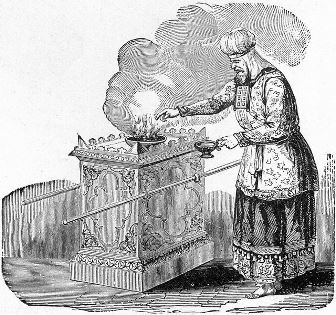In Torah Portion Tetzaveh (Exodus 27:20–30:10), two significant elements—the altar of incense and the oil for the lamp—highlight our relationship with Yahweh and our fellow beings. Yeshua said the greatest two commandments are to love Yahweh with all your heart, soul, mind and strength, and to love your neighbor as yourself. On these two commandments, he said – one regarding our Father and one regarding our brothers and sisters – rest all the Law and the Prophets.
The Fragrance of Incense
God commands the construction of an altar for burning incense:
Moreover, you shall make an altar as a place for burning incense; you shall make it of acacia wood… You shall put this altar in front of the veil that is near the ark of the testimony, in front of the mercy seat that is over the ark of the testimony, where I will meet with you. Aaron shall burn fragrant incense on it.
Exodus 30:1, 6-7
This perpetual incense offering symbolizes our continuous prayers and communion with Yahweh. King David reflects this sentiment:
May my prayer be counted as incense before You.
Psalm 141:2
Similarly, Revelation depicts the prayers of the saints ascending with the incense:
And the smoke of the incense, with the prayers of the saints, went up before God out of the angel’s hand.
Revelation 8:4
The Purity of the Light
Tetzaveh also addresses the source of light in the Tabernacle:
You shall charge the sons of Israel, that they bring you clear oil of beaten olives for the light, to make a lamp burn continually.
Exodus 27:20
This pure olive oil produced a clear flame, representing the clarity and purity expected in our spiritual lives. Yeshua identifies Himself as the light of the world:
I am the light of the world.
John 8:12
He also extends this designation to His followers:
You are the light of the world. A city set on a hill cannot be hidden.
Matthew 5:14
This shared identity emphasizes our role to shine brightly through our actions, guided by the Holy Spirit.
Reflecting the Light Through Actions
Embracing Torah observance—such as keeping kosher, observing the Sabbath, and celebrating the feasts—is akin to the incense rising to Yahweh, reflecting our devotion. However, the light that others see, prompting them to glorify the Father, emanates from our good works inspired by the Holy Spirit. Scripture guides us on these deeds:
He has told you, O man, what is good; And what does Yahweh require of you But to do justice, to love kindness, And to walk humbly with your God?
Micah 6:8
Pure and undefiled religion in the sight of our God and Father is this: to visit orphans and widows in their distress, and to keep oneself unstained by the world.
James 1:27
Then the righteous will answer Him, “Lord, when did we see You hungry, and feed You, or thirsty, and give You something to drink?…” The King will answer and say to them, “Truly I say to you, to the extent that you did it to one of these brothers of Mine, even the least of them, you did it to Me”.
Matthew 25:37-40
Shining Our Light Today
We must reflect on our actions: Are we practicing justice, kindness, and humility? Are we caring for those in distress? Living such virtues ensures that others see our good deeds and are inspired to glorify God:
Live such good lives among the pagans that, though they accuse you of doing wrong, they may see your good deeds and glorify God on the day He visits us.
1 Peter 2:12, NIV
While personal observances like dietary choices may go unnoticed, our acts of kindness and justice shine brightly, illuminating the path for others to see and honor our Father in heaven.
You shall put this altar in front of the veil that is near the ark of the testimony, in front of the mercy seat that is over the ark of the testimony, where I will meet with you. Aaron shall burn fragrant incense on it; he shall burn it every morning when he trims the lamps. When Aaron trims the lamps at twilight, he shall burn incense.
Exodus 30:6-8
Both are important – the aroma produced by the incense and the light produced by the oil. They go together. If the lamps are not brightly lit when we burn the incense, we just might end up burning ourselves in the darkness.
By embodying the principles of incense and light from Torah Portion Tetzaveh, we deepen our relationship with Yahweh and positively impact those around us.
Unless marked otherwise, Scripture quotations are from the New American Standard Bible (NASB) © The Lockman Foundation

